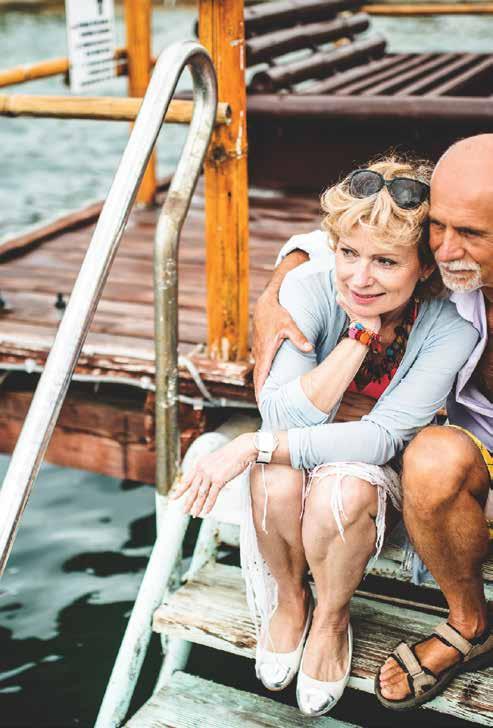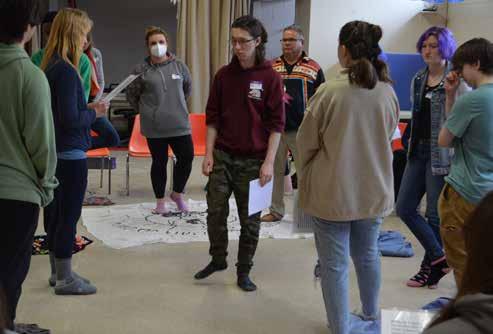
5 minute read
Listening and learning about the self-determining Indigenous Anglican Church
BY LEIGH ANNE WILLIAMS
The Rev. Dr. Ray Aldred, director of Indigenous Studies at the Vancouver School of Theology, shared his deep insights into the history of and current developments in the Indigenous Anglican Church in Canada with an audience gathered in a very large circle at Saint Paul University on March 23. His talk was titled ‘Self-determination & reconciliation?”
Advertisement
Aldred said he thought the vision of a self-determining Indigenous church had existed as long as the Gospel had been among Indigenous peoples. Listening to Bishop Lydia Mamakwa of the Indigenous Spiritual Ministry of Mishamikoweesh and Elders, however, he said he learned about the vision articulated in the 1950s by Archdeacon William Winters, who spoke of the need for an Indigenous church governed by Indigenous people. But at that time, most people in the Anglican Church and other denominations thought Indigenous people should just assimilate into Canadian churches.
In 1969, the Anglican Church of Canada asked a United Church minister Charles Hendry to do a report, which he published as a book called Beyond Traplines: Does the Church Really Care? In it, he urged the church to stop treating Indigenous people like children, Aldred explained.
“The question for us in the 1970s became how could you be fully Christian and fully Indigenous? How could you be both?” said Aldred. He recounted how the Indian Ecumenical Conference began and was held in Morley, Alberta on Stoney and Nakota Territory near Banff for about 15 years. At that time, some Indigenous people were asking the church to make room for their traditional spirituality.
He noted that non-Indigenous people have often interpreted discussions about self-determination to mean that Indigenous people wanted to leave the church.

“Because they cannot understand that you could be in a relationship, and there could be space between you, that a nation-to-nation relationship means that you maintain honour and respect….. The space between us is for collaboration. It doesn’t mean, though, that we’re exactly the same.”
Indigenous Anglicans were ready to create the Indigenous church long before the Anglican Church of Canada was ready, Aldred said Bishop Sidney Black told him. But it finally fell to the first National Indigenous Anglican Bishop Mark MacDonald to help establish the Indigenous Church. Advice from the Maori in New Zealand was not to do what they did and separate.
Indigenous Anglicans in Canada didn’t want to do that, Aldred said. “They were trying to stay in partnership with the Anglican Church of Canada, but they wanted to be self-determined. So then, they had to come up with a vision for what that meant.”
That vision is centred on the Gospel, he said. “We tried to create a Sacred Circle, maintain a Sacred Circle within the community. If two or three could gather together around the Gospel, the community would still have a witness to the Gospel. And who knows what would happen after that? So that’s the direction.”
Aldred described an Indigenous gathering that took place in October, highlighting the ways that the Indigenous church is evolving. “We prayed with smoke—smudged. They had a drummer who sang an honour song, and then of course, we processed to a hymn. We didn’t want to get carried away and actually process to an honour song. What would happen if we started doing things like that?” he said wryly. “I asked Bishop [of Missinipi] Adam Halkett, ‘So is that what you do all the time? Pray with smoke and have an honour song?’ He said, ‘No, that’s the first time we’ve ever done that.’ I thought, that’s cool, that’s a self-determining Indigenous church.”
Aldred challenged the Canadian church to do better in regard to its financial support of Indigenous ministry. “A lot of times Anglicans don’t know that Indigenous Anglicans will get paid nothing for doing ministry. Its non-stipendiary,” he said. “The Indigenous people themselves make a theology to say that that’s okay. They’ll even say things like, ‘It’s good we don’t get paid. Then we might be too reliant on that.’ I just don’t know how that’s right,” he said. “And then many of the agreements to pay some of these Indigenous bishops have run out and now they get paid nothing. The Anglican Church struggles to figure out how to repair that,” he said.
“We need to continue to work towards fixing or realigning things to see the furtherance of Indigenous self-determination,” he said. The dominant church needs to listen to and respond when Indigenous people put forward a request, he said. That listening also requires learning more about how Indigenous people communicate,” he said. He offered the example of the Vancouver School of Theology creating a program so that Indigenous people could earn a Master of Divinity degree in an Indigenous way so that they could be fully ordained in their denominations. He added that an alternative psychological analysis is also required because “we’ve encountered so much trauma. So you need to think differently about those things.”
At the end of his talk, Aldred said people always ask him what they can do. I’ve come up with three things, he said:
1
Heal the land. That includes healing the relationship between ourselves and the land. That includes things like water, that includes things like resolving land claims, it includes homelessness, … but it also includes healing the trauma that exists in our land and the unmarked graves…
2Indigenous people begin on the level of emotion. Western Christianity begins on the level of cognition. You’ve got to shift to speak from the heart and develop emotional intelligence, or emotional literacy, so that you could be someone who could listen and help people move through generational trauma. …I’ve seen many newcomers who are good at that, sitting and listening, and have been listening to help heal problems…. People can get good at that. That’s something all churches can do.
3And the third thing that churches can do is to cast a vision for unity that doesn’t end up with another denominationalism or sectarianism or imperialism, which is when churches command that everybody needs to get along… That doesn’t work. Unless you acknowledge [each group’s] significance, that they have value, groups never come together. You have to acknowledge the other if you want to be in relationship. …Too often the church wants to erase that difference. And that difference can be difference from the God.
The treaty tells us, when we make treaties with the newcomers, particularly our numbered of treaties, everyone should be able to enjoy a peaceful existence. Everybody should have access to the land. No one has the right to cut another people off from access to the land. A person can only possess what he can carry on his back, so how could you possess the land? The land carries us… Everybody should be able to live on the bounty of Mother Earth. No one should be hungry. And everyone has the right to be who they were created to be. That’s the truth.
We need to cast a vision for unity that’s doesn’t end in polarization or in silos of people…. We need to reinvent what it means to have common good. We need communities that are growing, that people in communities who feel that the level of intimacy and solidarity that they feel between themselves and other community members is growing.









